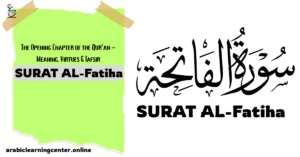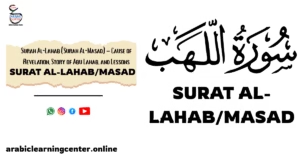Makkan Surah, 8 Verses
🌟 Overview
Surah Al-Zilzal, a concise Makkan Surah with 8 verses, dramatically depicts the Day of Judgment, when the earth will tremble and reveal all human deeds. Revealed in Makkah during the early years of the Prophet Muhammad’s ﷺ mission, it underscores the certainty of divine accountability, emphasizing that every action, no matter how small, will be weighed. Its powerful imagery and succinct message make it a compelling call to righteousness. 🕋
🕋 Revelation Background
According to Tafsir scholars like Mufti Shafi Usmani, Surah Al-Zilzal was revealed in the early Makkan period to challenge the Quraysh’s denial of the Hereafter. While specific incidents are not universally cited, the Surah addressed their skepticism about resurrection and judgment, using the imagery of a violent earthquake to affirm the reality of the Last Day and urge reflection on actions.
🌹 Distinctive Characteristics
Surah Al-Zilzal is renowned for its vivid imagery of the earth quaking and testifying to human deeds. 🌍
It uniquely emphasizes that even an atom’s weight of good or evil will be accounted for, highlighting the precision of divine justice. ⚖️
Its rhythmic tone and concise structure make it a powerful Surah for memorization and reflection, resonating with believers seeking spiritual focus. 🌟
📖 Tafsir Insights
Surah Al-Zilzal portrays the Day of Judgment as a cataclysmic event where the earth will shake violently, casting out its burdens (graves) and reporting human actions. People will emerge in scattered groups to face their deeds, with every good or evil act, no matter how small, determining their fate. The Surah urges believers to prioritize righteousness to secure salvation. 🕋
🕌 Hadith Connections
The Prophet ﷺ said: “Whoever recites Surah Al-Zilzal, it is as if he has recited a quarter of the Qur’an.” (Tirmidhi, graded weak but noted in Tafsir)
This narration, though weak, underscores the Surah’s spiritual significance, encouraging recitation to cultivate awareness of divine accountability and the weight of every deed.
🕋 Arabic and English Translation
بِسْمِ اللَّهِ الرَّحْمَٰنِ الرَّحِيمِ
Transliteration: Bismillahi ar-Rahmani ar-Raheem
Translation: With the name of Allah, the All-Merciful, the Very-Merciful.
1️⃣ إِذَا زُلْزِلَتِ الْأَرْضُ زِلْزَالَهَا
Transliteration: Idha zulzilatil-ardu zilzalaha
Translation: When the earth is shaken with its (final) earthquake.
2️⃣ وَأَخْرَجَتِ الْأَرْضُ أَثْقَالَهَا
Transliteration: Wa-akhrajatil-ardu athqalaha
Translation: And the earth throws out its burdens.
3️⃣ وَقَالَ الْإِنسَانُ مَا لَهَا
Transliteration: Wa-qalal-insanu ma laha
Translation: And man says, “What is the matter with it?”
4️⃣ يَوْمَئِذٍ تُحَدِّثُ أَخْبَارَهَا
Transliteration: Yawma’idhin tuhaddithu akhbaraha
Translation: On that Day, it will report its news.
5️⃣ بِأَنَّ رَبَّكَ أَوْحَىٰ لَهَا
Transliteration: Bi-anna rabbaka awha laha
Translation: Because your Lord has inspired it.
6️⃣ يَوْمَئِذٍ يَصْدُرُ النَّاسُ أَشْتَاتًا لِيُرَوْا أَعْمَالَهُمْ
Transliteration: Yawma’idhin yasdurun-nasu ashtatan liyuraw a‘malahum
Translation: On that Day, people will come forth in scattered groups to be shown their deeds.
7️⃣ فَمَن يَعْمَلْ مِثْقَالَ ذَرَّةٍ خَيْرًا يَرَهُ
Transliteration: Faman ya‘mal mithqala dharratin khayran yarah
Translation: So whoever does an atom’s weight of good will see it.
8️⃣ وَمَن يَعْمَلْ مِثْقَالَ ذَرَّةٍ شَرًّا يَرَهُ
Transliteration: Waman ya‘mal mithqala dharratin sharran yarah
Translation: And whoever does an atom’s weight of evil will see it.
💡 Key Themes
Surah Al-Zilzal centers on the certainty of the Day of Judgment, when the earth will testify to every human action. It emphasizes that no deed, however small, escapes divine accountability, urging believers to live with righteousness and mindfulness to secure a favorable outcome in the Hereafter. 🌟
🗝️ Life Applications
-
Value Every Action: Even the smallest deed, good or evil, impacts your fate. ⚖️
-
Prepare for Judgment: The earth’s testimony reminds us to ready ourselves for the Hereafter. 🌍
-
Avoid Negligence: No action is too minor to escape Allah’s reckoning. 🛑
-
Pursue Righteousness: Strive for good deeds to earn salvation. 🌹
-
Live with Awareness: Stay mindful of Allah’s command and accountability. 🙏
🕍 Historical Relevance
Revealed in Makkah, Surah Al-Zilzal challenged the Quraysh’s rejection of the Hereafter and their obsession with worldly pursuits. Its vivid imagery of the earth’s earthquake and testimony countered their disbelief, reinforcing the Prophet’s ﷺ call to Tawhid and ethical living. The Surah’s timeless message continues to guide believers toward spiritual priorities over temporary gains. 🕌
🌹 Benefits of Recitation
Reciting Surah Al-Zilzal fosters mindfulness of divine accountability and the significance of every action. Its concise, impactful message makes it ideal for prayers, encouraging reflection on the Hereafter. Tafsir traditions suggest that regular recitation strengthens faith, promotes righteousness, and reminds believers that every deed will be weighed. 🌟
📚 Learn Surah Al-Zilzal with Expert Guidance
📘 Detailed Grammar Breakdown
|
Arabic Word |
English Meaning |
Root |
Type |
Grammar & Notes |
|---|---|---|---|---|
|
إِذَا (Idha) |
When |
— |
Particle |
Conditional particle, introduces time clause. |
|
زُلْزِلَتِ (Zulzilat) |
Is shaken |
ز ل ز ل |
Verb (Form II, passive) |
Past tense: زَلْزَلَ (zalzala, he shook). Present: يُزَلْزِلُ (yuzalzilu, he shakes). Imperative: زَلْزِلْ (zalzil, shake!). Feminine, passive for earth. |
|
الْأَرْضُ (Al-Ardu) |
The earth |
أ ر ض |
Noun |
Definite, nominative. Subject of verb. |
|
زِلْزَالَهَا (Zilzalaha) |
Its earthquake |
ز ل ز ل |
Noun |
Accusative, adverbial. Ha = possessive pronoun (its). |
|
وَأَخْرَجَتِ (Wa-akhrajat) |
And throws out |
خ ر ج |
Verb (Form IV) |
Past tense: أَخْرَجَ (akhraja, he threw out). Present: يُخْرِجُ (yukhriju, he throws out). Imperative: أَخْرِجْ (akhrij, throw out!). Feminine for earth. |
|
أَثْقَالَهَا (Athqalaha) |
Its burdens |
ث ق ل |
Noun |
Accusative, plural. Ha = possessive pronoun (its). Refers to graves. |
|
وَقَالَ (Wa-qala) |
And says |
ق و ل |
Verb (Form I) |
Past tense: قَالَ (qala, he said). Present: يَقُولُ (yaqulu, he says). Imperative: قُلْ (qul, say!). |
|
الْإِنسَانُ (Al-Insanu) |
Man |
أ ن س |
Noun |
Definite, nominative. Generic for humanity. |
|
مَا لَهَا (Ma laha) |
What is the matter with it |
— |
Phrase |
Ma (what) + laha (for it, feminine). Refers to earth. |
|
يَوْمَئِذٍ (Yawma’idhin) |
On that Day |
ي و م |
Noun |
Yawm (day) + idhin (that), genitive. Refers to Judgment Day. |
|
تُحَدِّثُ (Tuhaddithu) |
It will report |
ح د ث |
Verb (Form II) |
Present tense: يُحَدِّثُ (yuhaddithu, he reports). Past: حَدَّثَ (haddatha, he reported). Imperative: حَدِّثْ (haddith, report!). Feminine for earth. |
|
أَخْبَارَهَا (Akhbaraha) |
Its news |
خ ب ر |
Noun |
Accusative, plural. Ha = possessive pronoun (its). Refers to deeds. |
|
بِأَنَّ (Bi-anna) |
Because |
— |
Particle |
Bi (by) + anna (that), introduces clause. |
|
رَبَّكَ (Rabbaka) |
Your Lord |
ر ب ب |
Noun |
Accusative. Ka = possessive pronoun (your). |
|
أَوْحَىٰ (Awha) |
Has inspired |
و ح ي |
Verb (Form IV) |
Past tense: أَوْحَى (awha, he inspired). Present: يُوحِي (yuhi, he inspires). Imperative: أَوْحِ (awhi, inspire!). |
|
لَهَا (Laha) |
To it |
— |
Preposition + pronoun |
La (to) + ha (it, feminine). Refers to earth. |
|
يَصْدُرُ (Yasdur) |
Come forth |
ص د ر |
Verb (Form I) |
Present tense: يَصْدُرُ (yasduru, he comes forth). Past: صَدَرَ (sadara, he came forth). Imperative: اُصْدُرْ (usdur, come forth!). |
|
النَّاسُ (An-Nasu) |
People |
ن و س |
Noun |
Definite, nominative. Generic for humanity. |
|
أَشْتَاتًا (Ashtatan) |
In scattered groups |
ش ت ت |
Noun |
Accusative, adverbial. Describes manner of emergence. |
|
لِيُرَوْا (Liyuraw) |
To be shown |
ر أ ي |
Verb (Form IV, passive) |
Present tense: يُرَى (yura, he is shown). Past: أُرِيَ (uriya, he was shown). Imperative: أَرِ (ari, show!). Subjunctive for purpose. |
|
أَعْمَالَهُمْ (A‘malahum) |
Their deeds |
ع م ل |
Noun |
Accusative, plural. Hum = possessive pronoun (their). |
|
فَمَن (Faman) |
So whoever |
— |
Particle + pronoun |
Fa (so) + man (whoever), nominative. |
|
يَعْمَلْ (Ya‘mal) |
Does |
ع م ل |
Verb (Form I) |
Present tense: يَعْمَلُ (ya‘malu, he does). Past: عَمِلَ (‘amila, he did). Imperative: اِعْمَلْ (i‘mal, do!). Subjunctive. |
|
مِثْقَالَ (Mithqala) |
Weight |
ث ق ل |
Noun |
Accusative. Measure or quantity. |
|
ذَرَّةٍ (Dharratin) |
Atom |
ذ ر ر |
Noun |
Genitive, in idhafah (atom’s weight). |
|
خَيْرًا (Khayran) |
Good |
خ ي ر |
Noun |
Accusative, indefinite. Object of verb. |
|
يَرَهُ (Yarah) |
Will see it |
ر أ ي |
Verb (Form I) |
Present tense: يَرَى (yara, he sees). Past: رَأَى (ra’a, he saw). Imperative: اِرَ (ira, see!). Hu = object pronoun (it). |
|
شَرًّا (Sharran) |
Evil |
ش ر ر |
Noun |
Accusative, indefinite. Object of verb. |
READ OTHER SURAHS
Surah AL Fatiha Surah Al Nas Surah Al Falaq Surah Al Ikhlas Surah Al-Lahab (Surah Al-Masad] Surah Al-Nasr Surah Al-Kafiroon Surah Al-Kauthar Surah Al- Maun Surah Al-Quraysh Surah Al-Fil Surah Al-Humazah Surah Al-Asr Surah Al Takathur Surah Al Qari'ah Surah Al-Adiyat



